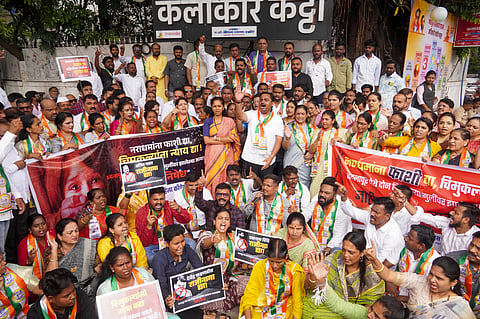

After the Bombay High Court order asking the Maha Vikas Aghadi (MVA) not to hold a statewide bandh in Maharashtra over the sexual assault of two kindergarten girls in a school at Badlapur in Thane, the Opposition has decided to protest by wearing black armbands and putting black tape on their mouths.
This came after a Public Interest Litigation (PIL) was filed seeking a declaration that the bandh is illegal and unconstitutional.
The Division Bench of Chief Justice Devendra Kumar Upadhyaya and Justice Amit Borkar pronounced the order on Friday. The court said, “Until further orders, all parties are restrained from proceeding with the bandh on August 24 or any other subsequent date.”
Reacting to the HC order, Sharad Pawar said they have decided to call off the Maharashtra bandh. He said that the bandh was called to express the people’s feelings and anger against the Badlapur incident. “The intention of the bandh was to draw the government's attentions and the decision was taken within the legal and constitutional framework. But the high court has asked to restrain from calling it therefore we decided to call off the bandh,” the former Union agriculture minister said.
He said that they wanted to appeal against the decision, but they had little time therefore they will follow the order of the high court. Pawar, as a part of the protest, will sit at the statue of Dr BR Ambedkar in Pune for a few hours.
Maharashtra Congress president Nana Patole said they respect the order of the court therefore instead of calling the bandh, they will put black tape on the mouth and wear armbands in protest against the Badlapur incident. He said the Congress will do this in every district of Maharashtra.
The court directed state authorities to strictly enforce the order of the division bench of the Bombay High Court in the case of B. G. Deshmukh and ors. vs. State of Maharashtra and ors. (Writ Petition No.2827 of 2003), where it was declared that a bandh or hartal by a political party, organisation or association would amount to an unconstitutional act.
The petitioners argued that the statewide bandh would cripple the entire state machinery and cause great inconvenience to the common people. It was stated that past bandhs and agitations in the state led to destruction of public property and caused economic losses.
One counsel argued that the bandh would impact schools, where children get mid-day meals, and cause hardships to economically weaker sections of society.